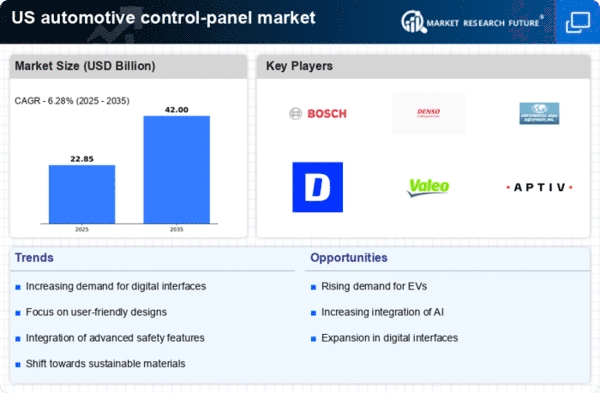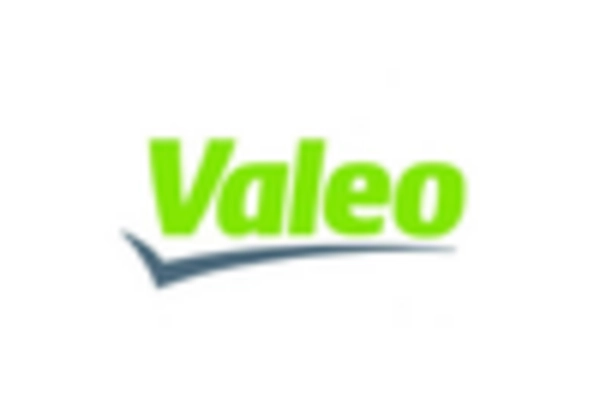Rising Demand for Electric Vehicles
The automotive control-panel market experiences a notable surge in demand due to the increasing adoption of electric vehicles (EVs) in the US. As consumers gravitate towards EVs, manufacturers are compelled to innovate control panels that cater to the unique functionalities of these vehicles. The automotive control-panel market is projected to grow at a CAGR of approximately 10% from 2025 to 2030, driven by the need for advanced displays and controls that enhance user experience. This shift necessitates the integration of sophisticated technologies, such as touchscreens and digital interfaces, which are essential for the modern EV driver. Consequently, the automotive control-panel market is evolving to meet these demands, ensuring that control panels are not only functional but also aesthetically pleasing and user-friendly.
Consumer Preference for Customization
Consumer preferences are shifting towards personalized experiences in the automotive sector, which significantly impacts the automotive control-panel market. As drivers seek to customize their vehicles to reflect their individual tastes, manufacturers are responding by offering more customizable control panels. This trend is evident in the increasing demand for features such as adjustable ambient lighting and configurable display layouts. Market analysis suggests that the customization segment within the automotive control-panel market could grow by 20% in the coming years, as consumers prioritize unique features that enhance their driving experience. This shift not only drives innovation but also encourages manufacturers to explore new design possibilities, ultimately enriching the automotive control-panel market.
Increased Focus on Driver Assistance Systems
The automotive control-panel market is significantly influenced by the growing emphasis on driver assistance systems. As safety regulations become more stringent, manufacturers are integrating advanced driver-assistance systems (ADAS) into their vehicles, which necessitates the development of sophisticated control panels. These systems, which include features such as lane-keeping assist and adaptive cruise control, require intuitive interfaces that provide real-time feedback to drivers. The automotive control-panel market is projected to expand as a result, with an estimated growth rate of 12% over the next five years. This focus on safety not only enhances the driving experience but also aligns with regulatory requirements, making it a crucial driver for the automotive control-panel market.
Technological Advancements in User Interfaces
Technological advancements play a pivotal role in shaping the automotive control-panel market. The introduction of intuitive user interfaces, including voice recognition and gesture control, enhances the driving experience by allowing drivers to interact with their vehicles more seamlessly. As the automotive industry embraces digital transformation, the automotive control-panel market is likely to witness a shift towards more interactive and customizable interfaces. Reports indicate that the market for advanced user interfaces is expected to grow by 15% annually, reflecting the increasing consumer preference for high-tech features. This trend compels manufacturers to invest in research and development, ensuring that control panels are equipped with the latest technologies that cater to the evolving needs of consumers.
Regulatory Compliance and Environmental Standards
The automotive control-panel market is increasingly shaped by regulatory compliance and environmental standards. As governments implement stricter regulations regarding vehicle emissions and safety, manufacturers are compelled to adapt their control panels to meet these requirements. This includes the integration of eco-friendly materials and technologies that align with sustainability goals. The automotive control-panel market is expected to see a growth rate of 8% as companies invest in compliant designs that not only fulfill legal obligations but also appeal to environmentally conscious consumers. This focus on compliance and sustainability is likely to drive innovation within the automotive control-panel market, as manufacturers strive to create products that are both functional and environmentally responsible.
















